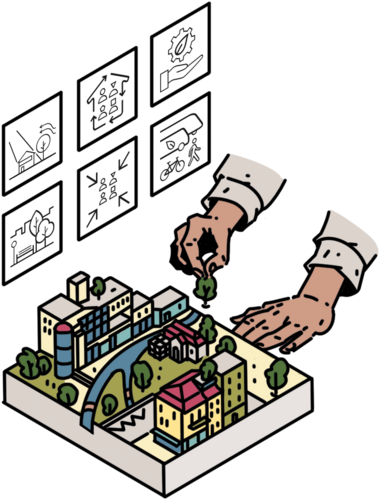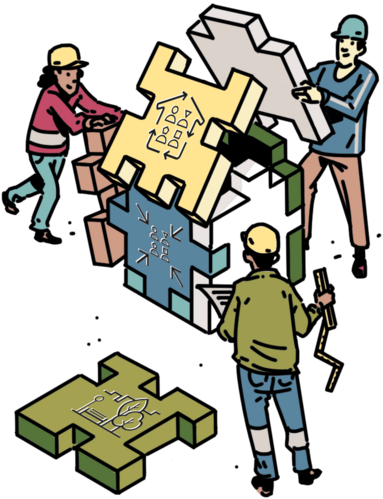
Real estate, a driver of social dynamics
Social guidelines for real estate
Individuals are the cornerstone of civilization, cities, and communities. The built environment shapes how people from diverse backgrounds interact and thrive. As globalization, urbanization, and population density increase, the need for the built environment to address modern social needs grows. Historically, social considerations in real estate were often neglected, but their importance is now recognized.
Social guidelines for real estate
With increasing urbanization, the real estate sector must address ecological challenges as well as social needs

Implenia develops, builds and manages homes, workplaces and infrastructure for future generations. This vision is based on the group's sustainability strategy throughout our project lifecycle.
In addition to the white paper "Net zero, how to take the path to net zero carbon buildings", we released a second publication: "Real estate, a driver of social dynamics". It proposes an approach to sustainability from a social perspective, highlighting the needs of individuals and communities. It is organized around nine objectives and is broken down into 33 measures that contribute to the social quality of buildings, sites, and cities.
Our offer to you in a nutshell
- You can download a poster here
- You can access the list of social measures after a registration here
Wincasa is Switzerland's leading integrated real estate service provider, offering its customers a broad portfolio of services throughout the entire life cycle of a property: from planning, construction and management to the revitalisation and repositioning of a property. The public limited company, which was founded in 1999, has a presence in all parts of the country and has been part of Implenia since May 2023.

Marc Lyon, Head Real Estate Development Switzerland
To access the list of social measures, please leave your contact details
After filling your data, you get immediate access to the full list of social measures
Methodology
The Implenia-Wincasa Social Real Estate Guidelines were developed through extensive research of European and Swiss social sustainability standards, complemented by over 20 interviews with specialists in spring 2024. Key considerations during information processing included:
- Aligning each measure with one of nine social goals reflecting future users' aspirations.
- Adapting guidelines for various implementation levels and scopes.
- Using practical examples to illustrate each measure's impact and effectiveness.
- Assigning responsibilities to stakeholders to identify the most accountable "best owner."
- Proposing indicators to assess the social impact of measures.
These guidelines are a starting point for socially responsible real estate projects but do not replace the need for the integration of experts such as psychologists and sociologists, who are essential for understanding the local context and identifying social needs. While it acknowledges ecological issues and their indirect influence on the social sphere, its primary focus is on social measures.
Social Goals
Nine goals for social real estate
- Foster and preserve social cohesion
- Guarantee equal and fair access for all
- Match spaces with social needs
- Offer sustainable services and raise awareness
- Support local economic development
- Deliver and sustain a high-quality built environment
- Establish a sense of safety and security
- Involve stakeholders to enhance acceptance
- Ensure fairness, safety, and equity in sourcing
Social needs vary by location, so a measure that works for one project may not suit another. It's essential to identify these needs and set clear objectives early in the planning stage. To avoid overloading the project, focus on a few key topics in detail.
To assist with objective-setting, nine social goals have been defined. These can be discussed with the client early on and selected as needed. Measures are then derived from these goals, each tagged according to its contribution.
Scope of application
Similar toCO2 accounting, social measures can be categorized into three scopes. Further, this document is based on the methodology of Zimraum GmbH and Stratcraft GmbH, which distinguishes three levels of application: corporate governance, real estate investment and asset management. The focus is placed on the latter two levels, as it is not the corporate that is highlighted in this approach, but the social quality of a real estate asset. The corporate perspective is exclusively considered for scope 3 (e.g., supply chains, working conditions), as these influence the social quality of a property during the construction phase.
| Corporate governance | Real estate investment | Asset management | |
| Scope 1 | Employees | Users * | Tenants * |
| Scope 2 | Customers & Suppliers | (Local) Stakeholders * | Neighborhoods * |
| Scope 3 | Stakeholders & Society * | Society as a whole * | Society as a whole * |
* Scopes considered for the research
Source: Zimraum GmbH and Stratcraft GmbH
Actors and interest groups
The online version of this document allows filtering based on actors (e.g., urban planners, municipal authorities, owners, users, property managers, etc.) and their responsibilities and guides the search with an additional level of detail. For the stakeholders, this means gaining a better understanding of their sphere of influence, becoming familiar with the range of measures available, and facilitating negotiations among actors to identify and select the appropriate social measures for the project. Ultimately, any selected measure will influence the profitability of the business case, the project design, or the operational phase of a project.

How to use the social guidelines?




To define an effective social strategy and ensure the expected impact of measures for each project, it is essential to understand the social context for each project.
We therefore recommend a four-step process to achieve this:
- Social context: Conduct an assessment to better understand the needs and social fabric.
- Strategy: Select and prioritize a few targeted objectives, "less is more".
- Action plan: Choose a limited number of measures to ensure their implementation, assign responsibility.
- Implementation: Monitor the integration of measures and their impacts at each phase of the project.
Poster "Real estate, a driver of social dynamics"
Download our social map to bring it to your next project meeting, helping your team define the social strategy and applicable measures
Authors

Wincasa
Alternatively, the business card is available for download. Download VCF-Card

Implenia Schweiz AG
Alternatively, the business card is available for download. Download VCF-Card
Acknowledgments
Graphic design
The paper brochure was produced with the invaluable collaboration of graphic designer Thomas Schicker Konzeption und Gestaltung, in association with illustrator Amadeus Waltenspühl. We wish to express our deep gratitude for their exceptional contribution to this project.
Interviewees
This research is the result of a collaboration between Implenia and Wincasa, with the external support of Dr. Joëlle Zimmerli of Zimraum GmbH and Dr. Christian Brütsch of Stratcraft GmbH. Furthermore, it incorporates insights gathered from interviews with over 20 professionals specializing in social sustainability within real estate. The research team extends its gratitude to all experts and practitioners who contributed to the interviews, offering valuable insights and feedback.
| Entity | Name / surname | Title / function |
| Association SEED | Sarah Schalles | Director |
| Allreal AG | David Guthörl | Head of Sustainability |
| Cooperative Codha | Joël Rochat | Representative of the MO |
| einfach-wohnen.ch | Mira Porstmann, Christine Steiner Bächi, Marianne Duttli | President/ Co-President |
| Emonitor AG | Daniel Baur | CEO OF |
| Emonitor AG | Petra Babic | Emonitor |
| Enoki Sàrl | Baptiste Gex | Cofounder |
| ETHZ | David Kaufmann | Assistant Professor at the Department of Civil, Environmental and Geomatic Engineering |
| Fair bridge AG | Kevin Rubner | Founder |
| HES SO Valais | Joelle Mastelic | Professor |
| Impact Real Estate | Daniel Kusio | Managing Director |
| Implenia AG | Bernadette Arbogast | Global Sustainability - Senior Project Manager |
| Implenia AG | Jelena Radovic | Real Estate Development - Head of marketing |
| Implenia AG | Miklos Gyarfas | Real Estate Development - Project Manager |
| Implenia AG | Christian Höchli | Real Estate Investment - Project Manager |
| Implenia AG | Marco Castagnero | Real Estate Management -Team Leader |
| KBOB | René Bäbler | Head of Sustainability in the Construction Sector |
| Urban Psychology | Alice Hollenstein | Founder |
| Wincasa AG | Corina Salomon | Team Leader Real Estate Community Management |
| Wincasa AG | Agon Baumann | Team Leader FM Solutions & Quality |
| Wüest & Partner | Francois-Xavier Favre | Head of Wüest & Partner W-CH |




